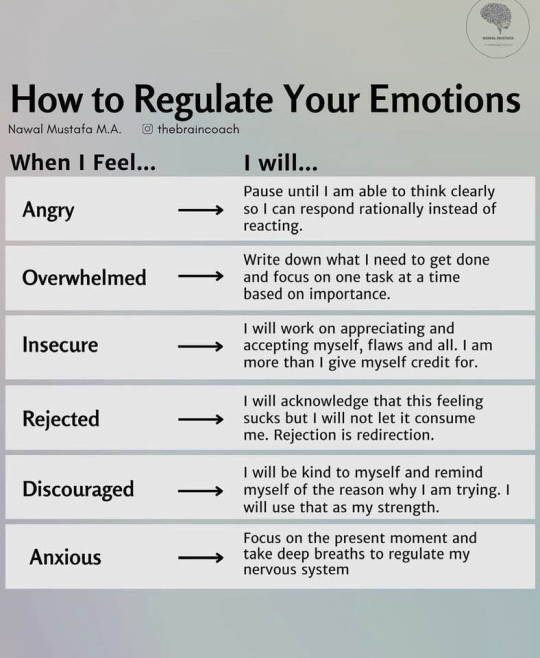#self regulating
Explore tagged Tumblr posts
Text

#self soothing#self regulating#respond don't react#feelings#emotions#big feelings#self care#mental health#self compassion
808 notes
·
View notes
Text

AUCTOBER day 18: Self Regulating
An october art challenge by @autiebiographical
Many people catch me play with my hair some have pointed it out
30 notes
·
View notes
Text
I’m about to save you thousands of dollars in therapy by teaching you what I learned paying thousands of dollars for therapy:
It may sound woo woo but it’s an important skill capitalism and hyper individualism have robbed us of as human beings.
Learn to process your emotions. It will improve your mental health and quality of life. Emotions serve a biological purpose, they aren’t just things that happen for no reason.
1. Pause and notice you’re having a big feeling or reaching for a distraction to maybe avoid a feeling. Notice what triggered the feeling or need for a distraction without judgement. Just note that it’s there. Don’t label it as good or bad.
2. Find it in your body. Where do you feel it? Your chest? Your head? Your stomach? Does it feel like a weight everywhere? Does it feel like you’re vibrating? Does it feel like you’re numb all over?
3. Name the feeling. Look up an emotion chart if you need to. Find the feeling that resonates the most with what you’re feeling. Is it disappointment? Heartbreak? Anxiety? Anger? Humiliation?
4. Validate the feeling. Sometimes feelings misfire or are disproportionately big, but they’re still valid. You don’t have to justify what you’re feeling, it’s just valid. Tell yourself “yeah it makes sense that you feel that right now.” Or something as simple as “I hear you.” For example: If I get really big feelings of humiliation when I lose at a game of chess, the feeling may not be necessary, but it is valid and makes sense if I grew up with parents who berated me every time I did something wrong. So I could say “Yeah I understand why we are feeling that way given how we were treated growing up. That’s valid.”
5. Do something with your body that’s not a mental distraction from the feeling. Something where you can still think. Go on a walk. Do something with your hands like art or crochet or baking. Journal. Clean a room. Figure out what works best for you.
6. Repeat, it takes practice but is a skill you can learn :)
#deconstruction#ex christian#ex evangelical#agnosticatheist#deconstructing christianity#agnostic#ex religious#exevangelical#religious trauma#trauma#cptsd#therapy#life skills#leftist#self healing#healing is a process#Emdr#emdr therapy#ifs therapy#emotional regulation#emotional health#heading#trauma therapy#religious trauma syndrome#anti capitalist#humanism#coping mechanism#coping skills#cult survivor#deconvert
65K notes
·
View notes
Text
Self regulating but it's me giving my body to you so I don't have to think for while
#puppy brain#bd/sm relationship#puppy talk#bd/sm master#masters pet#dom sub.#bd/sm daddy#master.#self regulating
1 note
·
View note
Text
Pay attention to what makes you feel on edge. If you’re feeling angry try to stop and assess what is triggering that anger. It doesn’t have to make sense. Is the sound of shoes squeaking on the floor grating? Is the way someone is asking you for something upsetting even if the ask isn’t? Understanding what is bothering us is the first step to diffusing our anger.
#suggestions#suggestion blog#mental health#anger#emotional#emotional regulation#adhd#actually autistic#recovery#positivity#self love#ed recovery#self care#meltdowns#healing#mental health suggestions
4K notes
·
View notes
Text
Another side of “If you can’t love yourself, how the hell are you gonna love someone else?”
(Also, “how you gonna love someone else” has nothing to do with whether or not you will be loveable or loved. Everyone on this planet has been loved, no matter how far they went)
Today, I am expressly thinking about bullies.
I have never met a bully in all my life, that has loved themselves. They are usually full of shame, and unable to self regulate, so they take it out on everyone else. (is this a permanent thing? no. they have to fix it though. It HAS to come from them)
Bullying isn’t loving. and it doesn’t stay “contained” to just one situation, but it’d never come to a home life.... no.
It bleeds over everything, and will beat on anything.
1 note
·
View note
Text
There's space for all your feelings, even when they conflict with each other. You don't have to make sense of them. Just notice them as they come and go.
#positivity#emotions#emotional regulation#emotional tolerance#recovery#affirmations#mental health#self acceptance#self care
1K notes
·
View notes
Text

#important reminders#healing#self love#self care#rest is productive#rest is important#resting#mental heath support#tw mental health#mental health#recovery#recovering perfectionist#it girl energy#it girl#pink pilates girl#pink pilates princess#becoming that girl#that girl#feminine health#psychology#neurodivergent#neuroscience#neurodiverse stuff#adhd#bpd#cptsd recovery#stress#nervous system#emotional regulation
435 notes
·
View notes
Text
Greenwashing set Canada on fire

On September 22, I'm (virtually) presenting at the DIG Festival in Modena, Italy. On September 27, I'll be at Chevalier's Books in Los Angeles with Brian Merchant for a joint launch for my new book The Internet Con and his new book, Blood in the Machine.

As a teenager growing up in Ontario, I always envied the kids who spent their summers tree planting; they'd come back from the bush in September, insect-chewed and leathery, with new muscle, incredible stories, thousands of dollars, and a glow imparted by the knowledge that they'd made a new forest with their own blistered hands.
I was too unathletic to follow them into the bush, but I spent my summers doing my bit, ringing doorbells for Greenpeace to get my neighbours fired up about the Canadian pulp-and-paper industry, which wasn't merely clear-cutting our old-growth forests – it was also poisoning the Great Lakes system with PCBs, threatening us all.
At the time, I thought of tree-planting as a small victory – sure, our homegrown, rapacious, extractive industry was able to pollute with impunity, but at least the government had reined them in on forests, forcing them to pay my pals to spend their summers replacing the forests they'd fed into their mills.
I was wrong. Last summer's Canadian wildfires blanketed the whole east coast and midwest in choking smoke as millions of trees burned and millions of tons of CO2 were sent into the atmosphere. Those wildfires weren't just an effect of the climate emergency: they were made far worse by all those trees planted by my pals in the eighties and nineties.
Writing in the New York Times, novelist Claire Cameron describes her own teen years working in the bush, planting row after row of black spruces, precisely spaced at six-foot intervals:
https://www.nytimes.com/2023/09/15/opinion/wildfires-treeplanting-timebomb.html
Cameron's summer job was funded by the logging industry, whose self-pegulated, self-assigned "penalty" for clearcutting diverse forests of spruce, pine and aspen was to pay teenagers to create a tree farm, at nine cents per sapling (minus camp costs).
Black spruces are made to burn, filled with flammable sap and equipped with resin-filled cones that rely on fire, only opening and dropping seeds when they're heated. They're so flammable that firefighters call them "gas on a stick."
Cameron and her friends planted under brutal conditions: working long hours in blowlamp heat and dripping wet bulb humidity, amidst clouds of stinging insects, fingers blistered and muscles aching. But when they hit rock bottom and were ready to quit, they'd encourage one another with a rallying cry: "Let's go make a forest!"
Planting neat rows of black spruces was great for the logging industry: the even spacing guaranteed that when the trees matured, they could be easily reaped, with ample space between each near-identical tree for massive shears to operate. But that same monocropped, evenly spaced "forest" was also optimized to burn.
It burned.
The climate emergency's frequent droughts turn black spruces into "something closer to a blowtorch." The "pines in lines" approach to reforesting was an act of sabotage, not remediation. Black spruces are thirsty, and they absorb the water that moss needs to thrive, producing "kindling in the place of fire retardant."
Cameron's column concludes with this heartbreaking line: "Now when I think of that summer, I don’t think that I was planting trees at all. I was planting thousands of blowtorches a day."
The logging industry committed a triple crime. First, they stole our old-growth forests. Next, they (literally) planted a time-bomb across Ontario's north. Finally, they stole the idealism of people who genuinely cared about the environment. They taught a generation that resistance is futile, that anything you do to make a better future is a scam, and you're a sucker for falling for it. They planted nihilism with every tree.
That scam never ended. Today, we're sold carbon offsets, a modern Papal indulgence. We are told that if we pay the finance sector, they can absolve us for our climate sins. Carbon offsets are a scam, a market for lemons. The "offset" you buy might be a generated by a fake charity like the Nature Conservancy, who use well-intentioned donations to buy up wildlife reserves that can't be logged, which are then converted into carbon credits by promising not to log them:
https://pluralistic.net/2020/12/12/fairy-use-tale/#greenwashing
The credit-card company that promises to plant trees every time you use your card? They combine false promises, deceptive advertising, and legal threats against critics to convince you that you're saving the planet by shopping:
https://pluralistic.net/2021/11/17/do-well-do-good-do-nothing/#greenwashing
The carbon offset world is full of scams. The carbon offset that made the thing you bought into a "net zero" product? It might be a forest that already burned:
https://pluralistic.net/2022/03/11/a-market-for-flaming-lemons/#money-for-nothing
The only reason we have carbon offsets is that market cultists have spent forty years convincing us that actual regulation is impossible. In the neoliberal learned helplessness mind-palace, there's no way to simply say, "You may not log old-growth forests." Rather, we have to say, "We will 'align your incentives' by making you replace those forests."
The Climate Ad Project's "Murder Offsets" video deftly punctures this bubble. In it, a detective points his finger at the man who committed the locked-room murder in the isolated mansion. The murderer cheerfully admits that he did it, but produces a "murder offset," which allowed him to pay someone else not to commit a murder, using market-based price-discovery mechanisms to put a dollar-figure on the true worth of a murder, which he duly paid, making his kill absolutely fine:
https://pluralistic.net/2021/04/14/for-sale-green-indulgences/#killer-analogy
What's the alternative to murder offsets/carbon credits? We could ask our expert regulators to decide which carbon intensive activities are necessary and which ones aren't, and ban the unnecessary ones. We could ask those regulators to devise remediation programs that actually work. After all, there are plenty of forests that have already been clearcut, plenty that have burned. It would be nice to know how we can plant new forests there that aren't "thousands of blowtorches."
If that sounds implausible to you, then you've gotten trapped in the neoliberal mind-palace.
The term "regulatory capture" was popularized by far-right Chicago School economists who were promoting "public choice theory." In their telling, regulatory capture is inevitable, because companies will spend whatever it takes to get the government to pass laws making what they do legal, and making competing with them into a crime:
https://pluralistic.net/2022/06/13/public-choice/#ajit-pai-still-terrible
This is true, as far as it goes. Capitalists hate capitalism, and if an "entrepreneur" can make it illegal to compete with him, he will. But while this is a reasonable starting-point, the place that Public Choice Theory weirdos get to next is bonkers. They say that since corporations will always seek to capture their regulators, we should abolish regulators.
They say that it's impossible for good regulations to exist, and therefore the only regulation that is even possible is to let businesses do whatever they want and wait for the invisible hand to sweep away the bad companies. Rather than creating hand-washing rules for restaurant kitchens, we should let restaurateurs decide whether it's economically rational to make us shit ourselves to death. The ones that choose poorly will get bad online reviews and people will "vote with their dollars" for the good restaurants.
And if the online review site decides to sell "reputation management" to restaurants that get bad reviews? Well, soon the public will learn that the review site can't be trusted and they'll take their business elsewhere. No regulation needed! Unleash the innovators! Set the job-creators free!
This is the Ur-nihilism from which all the other nihilism springs. It contends that the regulations we have – the ones that keep our buildings from falling down on our heads, that keep our groceries from poisoning us, that keep our cars from exploding on impact – are either illusory, or perhaps the forgotten art of a lost civilization. Making good regulations is like embalming Pharaohs, something the ancients practiced in mist-shrouded, unrecoverable antiquity – and that may not have happened at all.
Regulation is corruptible, but it need not be corrupt. Regulation, like science, is a process of neutrally adjudicated, adversarial peer-review. In a robust regulatory process, multiple parties respond to a fact-intensive question – "what alloys and other properties make a reinforced steel joist structurally sound?" – with a mix of robust evidence and self-serving bullshit and then proceed to sort the two by pantsing each other, pointing out one another's lies.
The regulator, an independent expert with no conflicts of interest, sorts through the claims and counterclaims and makes a rule, showing their workings and leaving the door open to revisiting the rule based on new evidence or challenges to the evidence presented.
But when an industry becomes concentrated, it becomes unregulatable. 100 small and medium-sized companies will squabble. They'll struggle to come up with a common lie. There will always be defectors in their midst. Their conduct will be legible to external experts, who will be able to spot the self-serving BS.
But let that industry dwindle to a handful of giant companies, let them shrink to a number that will fit around a boardroom table, and they will sit down at a table and agree on a cozy arrangement that fucks us all over to their benefit. They will become so inbred that the only people who understand how they work will be their own insiders, and so top regulators will be drawn from their own number and be hopelessly conflicted.
When the corporate sector takes over, regulatory capture is inevitable. But corporate takeover isn't inevitable. We can – and have, and will again – fight corporate power, with antitrust law, with unions, and with consumer rights groups. Knowing things is possible. It simply requires that we keep the entities that profit by our confusion poor and thus weak.
The thing is, corporations don't always lie about regulations. Take the fight over working encryption, which – once again – the UK government is trying to ban:
https://www.theguardian.com/technology/2023/feb/24/signal-app-warns-it-will-quit-uk-if-law-weakens-end-to-end-encryption
Advocates for criminalising working encryption insist that the claims that this is impossible are the same kind of self-serving nonsense as claims that banning clearcutting of old-growth forests is impossible:
https://twitter.com/JimBethell/status/1699339739042599276
They say that when technologists say, "We can't make an encryption system that keeps bad guys out but lets good guys in," that they are being lazy and unimaginative. "I have faith in you geeks," they said. "Go nerd harder! You'll figure it out."
Google and Apple and Meta say that selectively breakable encryption is impossible. But they also claim that a bunch of eminently possible things are impossible. Apple claims that it's impossible to have a secure device where you get to decide which software you want to use and where publishers aren't deprive of 30 cents on every dollar you spend. Google says it's impossible to search the web without being comprehensively, nonconsensually spied upon from asshole to appetite. Meta insists that it's impossible to have digital social relationship without having your friendships surveilled and commodified.
While they're not lying about encryption, they are lying about these other things, and sorting out the lies from the truth is the job of regulators, but that job is nearly impossible thanks to the fact that everyone who runs a large online service tells the same lies – and the regulators themselves are alumni of the industry's upper eschelons.
Logging companies know a lot about forests. When we ask, "What is the best way to remediate our forests," the companies may well have useful things to say. But those useful things will be mixed with actively harmful lies. The carefully cultivated incompetence of our regulators means that they can't tell the difference.
Conspiratorialism is characterized as a problem of what people believe, but the true roots of conspiracy belief isn't what we believe, it's how we decide what to believe. It's not beliefs, it's epistemology.
Because most of us aren't qualified to sort good reforesting programs from bad ones. And even if we are, we're probably not also well-versed enough in cryptography to sort credible claims about encryption from wishful thinking. And even if we're capable of making that determination, we're not experts in food hygiene or structural engineering.
Daily life in the 21st century means resolving a thousand life-or-death technical questions every day. Our regulators – corrupted by literally out-of-control corporations – are no longer reliable sources of ground truth on these questions. The resulting epistemological chaos is a cancer that gnaws away at our resolve to do anything about it. It is a festering pool where nihilism outbreaks are incubated.
The liberal response to conspiratorialism is mockery. In her new book Doppelganger, Naomi Klein tells of how right-wing surveillance fearmongering about QR-code "vaccine passports" was dismissed with a glib, "Wait until they hear about cellphones!"
https://pluralistic.net/2023/09/05/not-that-naomi/#if-the-naomi-be-klein-youre-doing-just-fine
But as Klein points out, it's not good that our cellphones invade our privacy in the way that right-wing conspiracists thought that vaccine passports might. The nihilism of liberalism – which insists that things can't be changed except through market "solutions" – leads us to despair.
By contrast, leftism – a muscular belief in democratic, publicly run planning and action – offers a tonic to nihilism. We don't have to let logging companies decide whether a forest can be cut, or what should be planted when it is. We can have nice things. The art of finding out what's true or prudent didn't die with the Reagan Revolution (or the discount Canadian version, the Mulroney Malaise). The truth is knowable. Doing stuff is possible. Things don't have to be on fire.



If you'd like an essay-formatted version of this post to read or share, here's a link to it on pluralistic.net, my surveillance-free, ad-free, tracker-free blog:
https://pluralistic.net/2023/09/16/murder-offsets/#pulped-and-papered
#pluralistic#logging#pulp and paper#ontario#greenwashing#a market for lemons#incentives matter#capitalism#late-stage capitalism#climate emergency#wildfires#canada#canpoli#ontpoli#carbon offsets#self-regulation#nerd harder#epistemological chaos#regulatory capture#Claire Cameron#pines in lines
3K notes
·
View notes
Text

#meme#funny memes#dank memes#memedaddy#tumblr memes#twitter#chainsaw man#chainsaw man art#spirituality#girlblogging#this is what makes us girls#girlhood#i need a lobotomy#art#girls girls girls#im just a girl#chronically online#lana del rey#actually adhd#adhd brain#adhd problems#adhd things#adhd girl#adhd#autism#self care#self regulation#stimming#slow burn#burn out
640 notes
·
View notes
Text

#mental health#mental illness#recovery#love#self love#life#my life#self improvement#actually borderline#recovery inspiration#emotional health#regulate#better#be free
501 notes
·
View notes
Text






#creative block#writer's block#artist block#repressed anger#repressed trauma#emotional release#emotional regulation#mental health awareness#mental health#women's mental health#feminine energy#self healing#healing#girlblogging#this is a girlblog#girlposting#girl blogger#girl blog aesthetic#twitter#divine feminine
420 notes
·
View notes
Text
Femme Fatale Guide: Tips To Become More Emotionally Intelligent
Embrace self-awareness & self-reflection: Observe how you feel, behave, and how people generally respond to your words/actions in different situations
Practice self-regulation: Learn to differentiate between your feelings and the actions that would be appropriate in a specific setting or interaction. Internalize that feelings are fleeting and non-factual. You're in control of how you respond/(don't) act on these emotions
Engage in active listening: Pay attention to what others are saying with the intent of understanding, not responding
Focus on emotional differentiation: Understand where your thoughts, feelings, intentions, and opinions end and another person's identity/perception begins
Display radical empathy and acceptance: Understand that almost all people's words and actions result from their own beliefs, past experiences, and current life circumstances/priorities. Put yourself in their shoes when attempting to understand their choices, behaviors, and times they come to you to discuss a problem, success, or major life decision. Accept that you can only control what you do. Very little of other people's actions/the world's workings are personal. Things are happening around you, not to you
Let go of your ego: View yourself as objectively as possible with the potential for improvement. Abolish any superior complex or overwhelming desire to prove your self-importance in others' lives and decisions
Remain open-minded: Question your own beliefs and opinions. Stay curious as to why you believe them to be true/authentic to you. Allow your opinions to change or have the capacity to modify your beliefs upon hearing new information. Understand your worldview and values are valid, but they're not definitively correct beliefs, just because they resonate/feel comfortable for you
Be receptive to feedback: Embrace constructive criticism as a self-improvement tool. Approach it with curiosity and optimism, not as a personal attack
Differentiate between your feelings and capabilities: Your thoughts are not facts. Remember you can do things you don't feel like doing most of the time (work, waking up in the morning, working out, etc.). Learn the difference between being a slave to your emotions and genuinely running out of energy
#emotional intelligence#emotional regulation#emotional maturity#inner work#social skills#socializing#networking#social interaction#emotional resilience#people skills#self improvement#successhabits#glow up tips#femme fatale#dark femininity#dark feminine energy#it girl#high value woman#the feminine urge#queen energy#female power#dream girl#female excellence#high value mindset#life tips#adulting#life advice#femmefatalevibe#communication skills#emotional wellness
1K notes
·
View notes
Text



#cutest pilot in the resistance
#swedit#starwarsedit#star wars#the last jedi#poe dameron#flashing gif#nym.gifs#sorry snap#'nym why do you gif poe so much' because it's a self soothing technique#helps me regulate. anyway.
686 notes
·
View notes
Text
the more you have to be in contact with people that only trigger you or frustrate you, the more nervous and willing to shut off from the world you become. that's normal. try to find some time for yourself, to unwind in any way you can... you deserve that from you, don't let others' emotions and behaviours hold so much power onto you
#words#healing#important#positivity#thoughts#self love#self healing#positive thinking#healingjourney#self care#relationships#self embrace#self support#self regulation#distress#self help
586 notes
·
View notes
Text
"born to live"
darling, you were never born to die...you were born to live. you were born to feel the air splurge through your lungs, to feel the sunlight warming your back, to hear the birds sing early in the morning. may these little joys coat your existence akin to a warm blanket. may they keep your heart beating. never lose the childlike wonder locked in your core, too beautiful a thing it is to let go of.
#writing#creative writing#poem#poetry#creative inspiration#dead poets society#society#authenticity#self love#self care#self improvement#self image#inspiration#inspiring words#inspiring#creative process#writers on tumblr#writeblr#writerscommunity#writers#writers and poets#limiting beliefs#trust yourself#identity#writing community#mind#self regulation#regulation#soul#born to live
273 notes
·
View notes